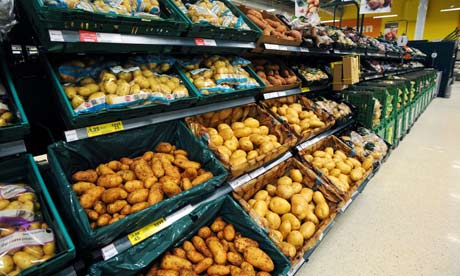British shoppers warned of fruit and veg shortages
Some UK supermarkets are struggling to keep shelves stocked with fresh produce following poor harvests

Potatoes that have visible cracks and blemishes will go on sale in UK supermarkets after a poor harvest this summer. Photograph: Marc MacDonald/Alamy
This summer's poor UK harvest has left some supermarkets struggling to keep shelves stocked with fresh produce and taking the unusual step of apologising for the fact that some fruit and vegetables are of lower quality than usual.
Following today's warning from the National Farmers' Union (NFU) on low wheat yields, supermarkets have not ruled out the prospect of price rises in the future. But they pledged to help Britain's hard-pressed families by offering "competitive pricing" of staple and essential food items in their value and economy ranges.
Asda said: "We are working hard with our growers to give them long-term sustainability. Where crops have been badly affected by the weather, we have flexed our specifications to help British growers get as much of their produce into our stores as possible. Keeping prices low for our shoppers is as important now that it has ever been, and that will remain our commitment."
A spokeswoman for Waitrose said: "There's no doubt that this has been an exceptionally tough growing season for our farmers who have been coping with very bad weather and rising costs for critical inputs such as fuel. We are working closely with all our growers to help them manage their costs and get as much of their crop on our shelves as possible through initiatives such as selling cosmetically imperfect but good quality fruit and veg - something we have always done."
Sainsbury's said in a statement: "We can't comment on future prices. We continue to do mix and match offers across fruit and vegetable such as two for £3. We continue to work with British farmers and growers to get the most out of the crop. We've taken the decision to radically change our approach to buying British fruit and vegetables as a result of this year's unseasonal weather."
The run of unpredictable weather this season has left farmers and growers with bumper crops of "ugly" fruit and vegetables with reported increases in blemishes and scarring, as well as shortages due to later crops. This week, Sainsbury's launched a trial of its Basics range of potatoes that have visible cracks and blemishes in more than 35 stores in the Midlands. Last month the supermarket said it was relaxing its rules on the cosmetic appereance of fresh produce.
A Tesco spokeswoman said: "British farmers have had a challenging summer with bad weather affecting crops and horticulture in particular. We're supporting our farmers and suppliers at this time and working very closely with them to understand the impact of this year's harvest. We will also continue to offer our customers great value at a difficult time for many families."
New research by consumer group Which? found that the average cost of a shopping bill is now £76.83 per week - an increase of £5.66 compared with a year ago. Which? executive director, Richard Lloyd, said: "The rising price of food is one of consumers' top financial worries and is changing the way we shop. Recent Which? research found more of us are shopping at discount supermarkets and four in 10 people told us they planned to cut back on their food shopping. We want retailers to be clearer about food pricing and offer responsible price promotions that give the consumer the best possible value for money."
Conservative MP Laura Sandys said: "Today's report by the NFU reaffirms the urgent need to put the consumer at the very heart of policy-making. With those on benefits, low-income families and pensioners having to bear the brunt of increasing food prices, government needs to put in place measures to support families to become more resilient to manage the rising cost of living. It cannot be right that UK consumers' weekly shop has increased by 6.4% - double the EU average."
New figures from the charity FareShare – that fights hunger and food waste in the UK – shows that lower income families have cut their consumption of fruit and vegetables by nearly one-third in the wake of the recession and rising food prices, to just over half of the five-a-day portions recommended for a healthy diet. And in the UK some 5.8 million people are living in deep poverty, meaning they struggle to afford everyday essentials like food.
Richard Dodd, spokesman for the British Retail Consortium, said: "There are price pressures in the system which are coming from poor wheat harvests in this country but also in the other big wheat-producing countries. Our own figures for the shop price inflation for food show that it has been very, very stable – it has been 3.1 % for the last three months which is a two-year low and compares with over 10% in 2008. There is no food price explosion going on but there are pressures in the system that will work through. Our fiercely competitive retail market is protecting customers from the worst effects of these price pressures."
No hay comentarios:
Publicar un comentario